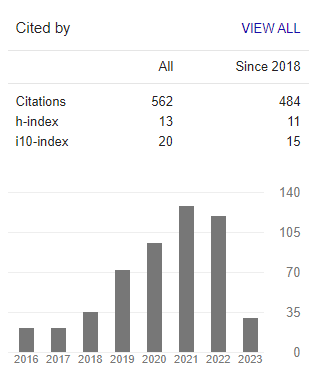HOAX AND THE CRISIS OF HEALTH COMMUNICATION-PUBLIC SPHERE
Abstract
Digital media development makes easier for everyone to share information. One of the visible characteristics is the change of audience role to be more active in the convergence era. At this point, hoax comes, such as vaccine danger which massively spreads in 2017-2018. The hoax case content is about kinds of concern, such as health clinical sense, work of digital media, to religious dogma. The article studies the vaccine danger polemic in 2017-2018, from the kinds of hoax appearance to the crisis of the health communication-public sphere in the digital era. This study finds that: First, new media offers people more personal communication space where they can be a consumer and producer of information at once. Second, a clinical sense of health becomes a claim for being right that makes people trust scientific logic and eliminate critical attitude to manipulative works. Third, the health information gap and lack of people's understanding of medical and technical terms make them active consumers who look for information independently through digital media. Fourth, people concern about health information needs so they pay attention to see, read, and even share information. Fifth, hoax with certain interest tends to purpose on fake news that spreads in social media massively. Sixth, insufficient digital literacy in society makes them lost in mass information in the new media era.
To cite this article (7th APA style):
Praptiningsih, W. & Kurnia, N. (2020). Hoax and the Crisis of Communication-Public Sphere. Journal Communication Spectrum, 10(1), 1-9. http://doi.org/10.36782/jcs.v10i1.2002Keywords
References
Amindoni, A. (2018, August 22). Vaksin MR ‘tidak halal’: MUI Pusat Bolehkan karena Darurat, di Daerah Masih Ada yang Menolak [MR Vaccine is 'Not Halal': MUI (Ulema Council) allows Due to Emergency, Some Areas Still Refuse]. BBC News Indonesia. https://www.bbc.com/indonesia/indonesia-45248643
Argenti, P. A. (2006). How Technology Has Influenced the Field of Corporate Communication. Journal of Businnes and Technical Communication, 20(3), 357-370
Ariwibowo (2018, Mei 1). Survei Menyebutkan Hoax Terbanyak Soal Info Kesehatan [The Survey Mentioned the Most Hoax About Health Info]. Antara Online. http://www.antaranews.com
Barran, J. (2010). Pengantar Komunikasi Massa: Literasi Media dan Budaya [Introduction to Mass Communication: Media Literacy and Culture]. Salemba Humanika
Cho, M., Furey, L. D. and Mohr, T. (2017). Communicating Corporate Social Responsibility on Social Media: Strategies. Stakeholders, and Public Engagement on Corporate Facebook. Business and Professional Quaterly, 80(I), 52-69. https://doi.org/10.1177/2329490616663708
Depkes (2018, October 1). Kemenkes Serius Perangi Hoax Kesehatan [Ministry of Health Seriously Fight Health Hoaxes]. Biro Komunikasi dan Pelayanan Masyarakat Kementerian Kesehatan RI. http://www.depkes.go.id/article/view/17121900003/kemenkes-serius-perangi-hoax-kesehatan.html
Emilia, O. (2016). Sejarah Fakultas Kedokteran UGM 1946-2016: Berkembang dalam Perjuangan dan Kesederhanaan [History of the Faculty of Medicine UGM 1946-2016: Developing in Struggle and Simplicity]. Fakultas Kedokteran UGM. http://opac.lib.ugm.ac.id/index.php?mod=book_detail&sub=BookDetail&act=view&typ=htmlext&buku_id=771503&obyek_id=1
Fichman, E. and Keelan, J. E. (2007). Resister’s Logic: the Anti-Vaccination Arguments of Alfred Russel Wallace and their role in the debates over compulsory vaccination in England, 1870-1907. Studies in History and Philosophy of Biological and Biomedical Sciences, 585-607.
Finneman, T. and Thomas, R. J. (2018). A Family of Falsehoods: Deception, Media Hoaxes and Fake News. Newsarticle Research Journal, 39(3), 350-361.
Hardiman, F. B. (2009). Menuju Masyarakat Komunikatif [Towards the Communicative Society]. Kanisius
Ireton, C. and Posetti, J. (eds.). (2019). Journalism, ‘Fake News’ and Disinformation: Handbook for Journalism Education and Training. UNESCO. https://en.unesco.org/sites/default/files/journalism_fake_news_disinformation_print_friendly_0.pdf
Jenkins, H. (2006). Covergence Culture Where Old and New Media Collide. New York University Press
Juwita, R. (2017). Media Sosial dan Perkembangan Komunikasi Korporat [Social Media and the Development of Corporate Communications]. Jurnal Penelitian Komunikasi, 20(1), 47-60
Kompas (2018). Surat Kabar Harian Kompas, 1/02/2018, p. 5.
Lestari, S. and Budhi, O. (2017, September 18). Imunisasi Campak dan Rubella MR di Tengah Pro-Kontra Vaksinasi [Measles and Rubella MR Immunizations amid Vaccinations' Pro-Cons]. BBC Indonesia. https://www.bbc.com/indonesia/indonesia-41144515
Livingstone, S. (2004). The Challenge of Changing Audiens: Or, what is the Audience Researcher to do in the Age of internet. European Journal of Communication, 19, 75-85
Loedin, A. A. (2005). Sejarah Kedokteran di Bumi Indonesia [The History of Medicine in Indonesia]. Pusataka Utama Grafiti
Nasrullah, R. (2015). Media Sosial: Perspektif Komunikasi, Budaya dan Sosioteknologi [Social Media: Communication, Culture, and Sociotechnological Perspectives]. Simbiosa Rekatama Media
Sundet, V. S. and Ytreberg, E. (2009). Working Notions of Active Audiences: Further Research on the Active Participant in Convergent Media Industries. Convergence: The International Journal of Research into New Media Technologies, 15(4), 383-390. https://doi.org/10.1177/1354856509342339
Supelli, K. (2013). Filsafat Teknologi [The Philosophy of Technology]. Jurnal Filsafat Driyarkara, 34(3)
Wijaya, B. S., Faruk, Wahyuni, H. I. (2019). Nilai-Tanda sebagai Jantung Makna Relasi Konsumen dan Merek [Sign-values as the Central Meaning of Brand Relationships]. Jurnal Ilmu Komunikasi, 17(2), 181-192.
Wijaya, B. S. (2013). Korupsi Komunikasi dalam Dimensi Pesan, Media, Konteks dan Perilaku: Sebuah Proposisi Teoretis Untuk Riset [The Corruption of Communication in the Dimensions of Message, Media, Context, and Behavior: A Theoretical Proposition for Research]. Journal Communication Spectrum, 3(1), 1-13
WHO (2017). Smallpox Eradication. http://apps.who.int/iris/bitstream/handle/10665/126397/Chapter%2013.pdf;jsessionid=D5C53BEC0F1F86DB4E96120A8804C4CE?sequence=31
Refbacks
- There are currently no refbacks.

This work is licensed under a Creative Commons Attribution 3.0 License.
Indexed by:
Archived in:
Listed in:
INTERNATIONAL ASSOCIATION FOR MEDIA AND COMMUNICATION RESEARCH

















